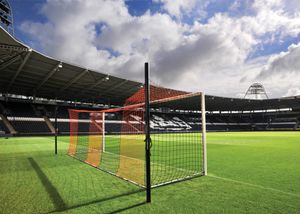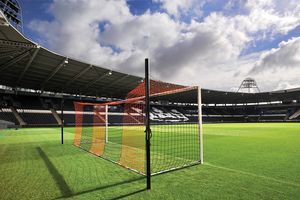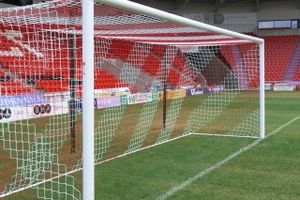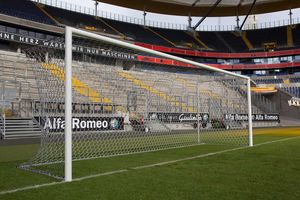How Long is a Football Season: Everything You Need to Know About the Premier League
At the epicentre of football excitement sits the Premier League. If you're a die-hard fan or just dipping your toes into the world of English football, our guide is your passport to the heart of the Premier League Season.
Kicking off on the 27th of May 1992, English football had a revamped top tier to reach.
Since its inception, the points-based league has become a massively popular competition thanks to its rich history, fiercely competitive matches, top-notch play, and incredible atmosphere. With so much happening in the league every week, it's no surprise that millions of people from around the globe tune in to see what all the fuss is about.
The structure of the Premier League season is pretty important for fans to understand, so we’ve put together a rundown of how long the football season is, and what the different stages are.
So, let's dive in!
How Long is a Football Season?
On average, a football season lasts around 9 months. The season starts at the end of summer in August and runs through to May the following year.
The scheduling of club football matches is determined by the respective governing bodies of each competition. For instance, in the English Premier League, the fixtures are decided by the Premier League, while the Football League fixtures are determined by the EFL. This ensures a well-organised and coordinated football calendar for all teams involved.
23/24 Season Dates
| English Football League | When Does it Start? | When Does it Finish? |
|---|---|---|
| Premier League | August 11th, 2023 | May 19th, 2024 |
| EFL Championship (Sky Bet EFL) | August 4th, 2023 | May 4th, 2024 |
| EFL League One | August 5th, 2023 | April 27th, 2024 |
| EFL League Two | August 5th, 2023 | April 27th, 2024 |
| National League (Vanarama National League) | August 5th, 2023 | April 20th, 2024 |
Some leagues, like the Sky Bet EFL, will also have play-offs and promotion finals, which take place after the official closing date.
| Football League | Play-Offs Dates |
|---|---|
| EFL Championship | Play-Off Final – May 26th, 2024 |
| EFL League One | Play-Off Final – May 18th, 2024 |
| EFL League Two | Play-Off Final – May 19th, 2024 |
| National League (Vanarama National League) | Play-Off Promotion Final – May 4th, 2024
North/South Promotion Finals – May 5th, 2024 |
We Recommend:
Premier League Timeline: From August to May
The typical Premier League season runs from August to May, but there have been some disruptions to this schedule over the years due to global events such as World Cup competitions held in the winter and global Pandemics.
For the uninitiated, we've broken down the season month-by-month to give you a clearer idea of the country's domestic season and how it fits into the international football calendar.
Pre-Season Football
Before the main season of football begins, most leagues have a pre-season period. During the pre-season, footballers are required to return to their clubs to begin training for the season ahead.
During the pre-season, friendly games are played. These games help new players integrate into the club and allow the whole team to get back into the swing of playing full 90-minute games. The Premier League Summer Series took place at the beginning of the 23/24 season, which was a series of friendlies played in the USA.
August: Kicking Off the Season
The Premier League tends to kick off in the second week in August. In the weeks running up to this, the players will have taken part in pre-season training. This takes around 4 weeks in the lead-up to the new premier league season.The first few games of the season are crucial for teams and fans to see how their new players from the transfer window have integrated into the team. The fans tend to put a lot of weight on the first game to set the tone of the season.
Realistically, it can take a couple of weeks for the players to warm back up to the demanding schedule of the league. With that said, the 23/24 season start was full of goals, with barely a nil-nil draw in sight.
September: Getting to Know the Teams
From September onwards, the intensity of the league picks up. Teams play more regularly, sometimes twice a week. The Premier League fixtures are set out at the start of the season so teams can plan and prepare for their toughest opponents ahead of time.Fans and coaches alike will be starting to get a clearer picture of how their team is shaping up. This is also when European competitions kick off, and teams may need to take breaks from the Premier League for certain weeks to fit all their fixtures in.
September features a 1-week international break for the European Championship Qualifiers.
October: Settling into the Season
By October, teams are beginning to settle into their rhythm. Fans start to see which players have developed the most over the summer, and new strategies begin to be implemented. The number of draws also tends to decrease over this period as teams become increasingly familiar with one another on the pitch.This is also when newly promoted teams begin to show whether they're at risk of relegation or have what it takes to stay up.
There's another international break for the European Championship Qualifiers this month. This can disrupt the rhythm that teams are building up.
November: Time for Extending Leads
By the time November rolls around, the weather is getting colder, and midweek matches are floodlit. There's one more international break for the European Championship Qualifiers this month, the last international break of the calendar year.
As the season progresses, the draws typically increase in number again. It's also when teams start to make or break their seasons. Clubs at the top of the table are looking to extend their lead, while those at the bottom are trying to find something to salvage before things ramp up.
December: The Most Wonderful Time of the Season
December is the month when the Premier League truly distinguishes itself from other European leagues. While many major European leagues take a winter break during the holiday season and resume playing in January, the Premier League traditionally intensifies its matches around the end-of-year festivities, wrapping up the calendar year with a bang.There have been many discussions among Premier League clubs and fans debating whether the league would benefit from a winter break to benefit Premier League players in international competitions. Teams can face a lot of fixture congestion around December, which can lead to fatigue and increased injuries.
January: Resolutions, Transfers, and International Breaks
The winter transfer window is a busy time as clubs look to strengthen their squads. starting on the 1st of January, the winter transfer window gives struggling teams a chance to enhance their team with a new player or two and perhaps drop some dead weight.There are two international breaks in January that disrupt the Premier League. The Asian Cup Qualifiers and the African Cup of Nations coincide from the second week of the month to the start of February.
February-March: Things Start Heating Up
This is when many players who were transferred during the transfer window get to make their debut with their new club, with the transfer window closing on the 1st of the month. Of course, this can be delayed due to the international break that spills over.Things start getting intense now, especially if the top teams are close or your team is at risk of relegation. At this point in the season, every point and goal counts to help improve your final standings in the league.
There's also a final international break during March for the European Qualifiers that can easily disrupt a team's bid for glory.
April-May: Reaching the Climax
Building up to the climax of the season, games can begin to get a bit tense between opposing teams. A lot of the time, there's a clear winner at this point, but if points and goal difference are close, it can make for an exciting end to the season.Of course, for those at the other end of the table, things can be just as exciting as teams battle it out to avoid relegation.
Key Premier League Dates & Milestones for the 23/24 Season
There are some key dates and milestones throughout the Premier League season you won't want to miss.
Key Dates for Your Diary
Even though all the games in the Premier League count toward the final result, there are some dates that are more important than others.
- The season opener - The summer break may not be that long, but the start of the season is always highly anticipated. The season kicks off in August. For the 23/24 season, the key date is August 11, 2023.
- Boxing Day fixtures - These matches are what sets the Prem apart from other leagues and championships. What better way to spend your Christmas than watching a glut of football matches? There are 10 matches on December 26, 2023.
- The Season Finale - Just as the opening day is filled with excitement, so is the last. This is when all positions are decided, and we know for sure who won and who's being relegated. The key date for the climax of the season is May 19, 2023.
Important Fixtures
There are some fixtures that pop up throughout the season that you just know are going to be exciting.
- Top of the Table Clashes - These games are always super exciting because the players have everything to play for. It's not just another win; it could be a crucial win.
- Local Derbies - Matches between the likes of Manchester City and Manchester United or Liverpool and Everton are brimming with excitement and anticipation. They're not just playing for a win but for local pride and bragging rights.
Inside the Premier League Season: Don't Miss It!
The premier league is one of the most exciting leagues in football. The competing teams are loved around the world, and it's seen as the pinnacle of the sport.
With the pace and quality of football that the league has become known for, it's no wonder it's one of the most popular leagues in the world. Now you know more about it, you can jump straight into the season.
Keep up to date with all things football nets and pitch quality with our blog and social media pages.
FAQs
How Long is a Football Season Premier League?
The Premier League season starts in August and continues until May, making it 9 months long. There are a few international competitions that interrupt the league, but it's pretty consistent with matches every week covering Friday to Monday.
Why is the UK Football Season in the Winter?
European football leagues, such as the English Premier League, Spanish La Liga, and German Bundesliga, typically play their seasons during the fall and winter months. This is because the majority of the sport's history has been played in countries with temperate climates, where the weather is typically cooler during the fall and winter months. This allows for the best playing conditions, as well as avoiding the extreme heat of summer.
Why is Football Not in the Summer?
The decision not to play in summer is mostly influenced by historical tradition, unpredictable climate, fixture congestion, international competitions, and the need for an off-season break. It also allows for the World Cup to fit in seamlessly with the football season every four years.
What Month Does Football Stop?
The majority of football seasons end in May. This is before the temperature begins to rise too much to comfortably play. It also allows time for World Cup preparations during World Cup years and provides a 3-month off-season for players to rest and recover.





